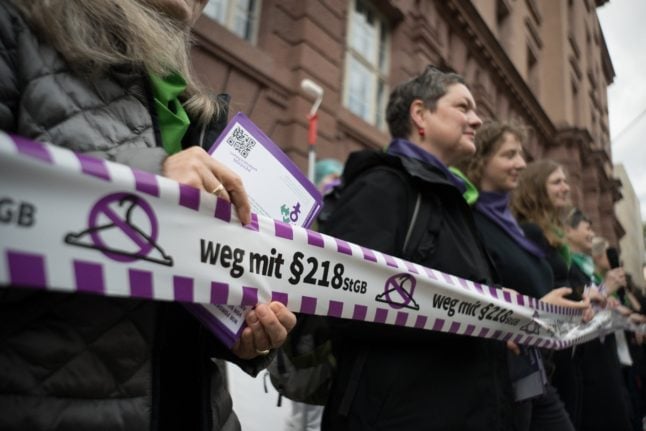Under current German law, abortion is illegal but tolerated in practice for women who are up to 12 weeks pregnant and have received compulsory counselling.
There are also exceptions for women who have been raped or whose life is in danger.
The commission, set up last year by Chancellor Olaf Scholz’s coalition government, recommended relaxing the law in a 600-page report published on Monday.
The current situation is “untenable”, said Liane Woerner, a law professor and member of the group, urging the government to “take action to make abortion legal and unpunishable” in the first trimester.
READ ALSO: Will abortion in Germany soon become legal?
The commission also recommended examining whether abortion could be made legal at up to 22 weeks.
In the later stages of pregnancy, abortion should remain illegal, but “does not necessarily have to be punishable”, Woerner said.
The government will now study the report “carefully to determine the next steps”, Justice Minister Marco Buschmann told a press conference, warning against “debates that could inflame our society”.
The Centre for Reproductive Rights NGO welcomed the commission’s recommendations, saying Germany now had a “historic opportunity to modernise the law”.
“German law on abortion stigmatises women who seek abortion care and demeans their ability to make autonomous and informed decisions about their pregnancies,” said Adriana Lamackova, associate director for the NGO in Europe.
Reforming Germany’s abortion law was a flagship pledge of the current government, a coalition between Scholz’s Social Democrats, the Greens and the liberal FDP.
READ ALSO: Reader question – Is abortion illegal in Germany?
In 2022, the German parliament voted to remove a Nazi-era law that limited the information doctors and clinics could provide about abortions.
Government spokeswoman Christiane Hoffmann on Monday declined to comment on whether abortion could now be legalised before Germany’s next election in 2025.
“It will depend on how the debate develops,” she told a government press conference.
The opposition conservatives and the far right have rejected any relaxation of the law.




 Please whitelist us to continue reading.
Please whitelist us to continue reading.
Member comments